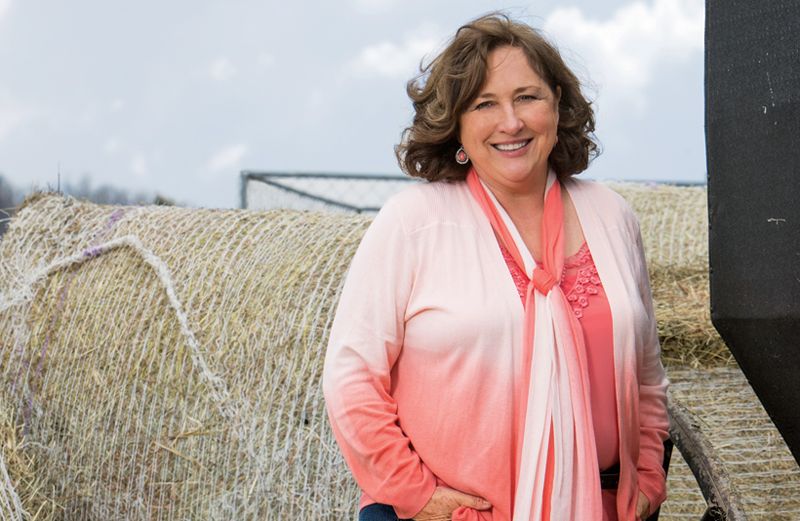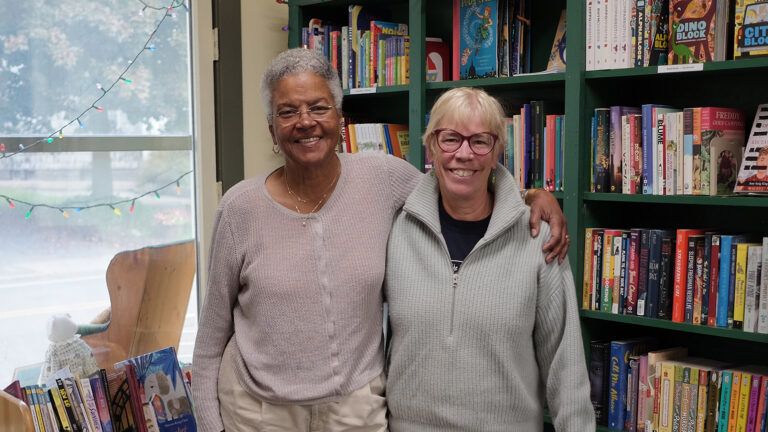I didn’t know what to say when my literary agent called that summer day a few years ago. It certainly was an interesting proposition. But it didn’t sound like something I could actually pull off.
“We’re looking for someone to write an Amish romance set in Ohio,” she said. “What do you think?”
I lived in Ohio, 30 minutes away from a small Amish community. That hardly made me an expert. If anything, the Amish confused me.
Just the other day, I’d seen a horse and buggy pulling out of the parking lot at Walmart. There was a Jeff Gordon bumper sticker on the back of the buggy. Here was this young Amish guy moving down the road at a sedate 10 miles per hour. In his heart, though, he was a NASCAR racer!
I could relate to wanting a simpler, more faithful way of life. After all, I was the wife of a minister and lived on a farm in Minford–population 693.
But I couldn’t see the harm in going to the beauty salon or having a cell phone. Weren’t the Amish taking it too far? Surely it was possible to connect to God without being stuck in the 1800s.
Still, I couldn’t pass up the opportunity. I’d waited till my sons were grown to pursue my dream of being a novelist. I’d written three books–none published. Was I really meant to be a writer? What was the point if no one could read my books?
“I’ll do it,” I told my agent, eager to prove myself.
I settled on the real-life town of Sugarcreek as the setting for the novel. Not only was the name evocative, but it was at the center of the largest Old Order Amish community in the world. I’d need to connect with real Amish folks, get the inside scoop.
So I booked a weeklong stay at a bed-and-breakfast, wrote a long list of questions in my notebook and tried not to freak out. From what I could tell, the Amish were a severe, closed-off people. Would they even talk to an “Englisch” outsider like me?
Arriving in Sugarcreek was like stepping into an episode of Little House on the Prairie. Rolling green hills. Fat cows. Old-fashioned farm wagons, tepee-shaped corn shocks and children running through the grass barefoot. I could feel it right away–a sense of abundance. Life was full here.
I checked into my room at Oak Haven Bed & Breakfast and chatted with the owners, Joyanne and Clay. Not Amish, they were originally from Texas and had transformed the 127-year-old farmhouse into a charming B and B.
Like everything I’d seen in Sugarcreek so far, the property was tidy and meticulously kept. Intentionally removed from the outside world. No TVs, phones or–heaven forbid!–Wi-Fi.
Clay had started praying for me the moment I booked my stay. He did that for every guest, and his prayer list was updated daily. On the wall near the kitchen was a wooden plaque with Hebrews 13:2 on it: “Be not forgetful to entertain strangers: for thereby some have entertained angels unawares.”
I scribbled the verse in my notebook–something for my novel, perhaps.
On the side, Joyanne and Clay also “hauled the Amish,” driving them on errands, shopping trips and doctor’s appointments in their two 15-passenger vans. They knew the community well.
I was thrilled when Joyanne invited me to dinner with Naomi and Luke, an Amish couple she’d befriended, and their family.
“I’ll get permission for you to attend,” she said. “You can ask questions.”
“That’d be great!” I said, thankful for the “in” to the Amish world.
Until then, I took in the sights and sounds and tastes of Sugarcreek. Many of the original Amish and Mennonite settlers had German and Swiss roots. That influence was everywhere, from the street names–like Edelweiss and Basel–to the chalet-style architecture.
There was even a giant cuckoo clock at the center of town. Every half hour, little mechanical wooden men with instruments popped out. I stopped for lunch at Beachy’s Country Chalet.
The Amish certainly didn’t cut corners. Everything was made by hand, even the wooden booths and the colorful quilts that lined the walls. And the food. Piecrust, thick and flaky. Slow-cooked beef. Creamy mashed potatoes. Gooey apple dumplings. I could actually smell the fresh-churned butter.
I was enjoying myself. But I hadn’t made any progress connecting with the Amish folk in town. At one point, I spotted a little boy manning a produce stand with his father. “How old are you?” I asked, crouching down so I was at his eye level. He didn’t answer.
His father whispered something to him in Pennsylvania German, then turned to me. “He doesn’t speak English,” he explained. “Not yet.” Like many of the Amish I’d met so far, he was polite, but reserved. I imagined he got a lot of questions from the thousands of tourists who visited Sugarcreek every year.
I hoped my dinner with Joyanne at Naomi and Luke’s house would go better. It was my only chance to sit down and talk with a real Old Order Amish family.
Dinner was set up outside on the lawn, since the house had no air-conditioning and would be too stuffy. All the guests were dressed formally in plain suits and dresses. I felt out of place in my blue jeans…and also a little envious.
The women around the table were so lovely even without makeup. Plus they could whip up a dress in one evening. I could barely sew on buttons.
We all bowed our heads and prayed silently. That was new. I was so used to praising God for all to hear. The food was, of course, delicious–I’d really have to get a cow for our farm in Minford, for the fresh milk and cream–and conversation flowed easily.
No picky eaters. The kids cleaned their plates. Best of all, there were no distractions. How long had it been since I’d sat down to dinner without someone’s cell phone buzzing?
After dinner, the adults sat in lawn chairs and watched the kids play volleyball. It was surreal. The girls in simple pastel dresses with their hair pinned up in kerchiefs, the boys with cloth suspenders, all of them running around the backyard and spiking the ball.
Aside from the clothes, something else was odd–the kids were content. No complaints or eye-rolling, not even from the teenagers.
I was so caught up in the game that I hadn’t realized Luke was staring at me. Had I done something wrong?
“Joyanne tells me you are writing a book on the Amish,” he said. His smile put me at ease. “Ask me anything. Nothing is forbidden.”
So I did. We covered the spiritual stuff and the everyday stuff too. The group talked about how Amish dress united the community. How parents measured everything, especially technology, against how it would affect the family.
And how shunning–banishment of members from the Amish community–was actually extremely rare. By question 50 or 60, everyone was starting to get a little goofy.
“When I have trouble getting to sleep, I don’t bother to count sheep,” one of the older men at the table said. “I just try to remember the names of all my seventy-three grandchildren!”
I laughed. The Amish in Sugarcreek weren’t at all what I’d expected. They were warm, welcoming, kind and funny. Reserved, sure, but relaxed and confident in their way of life.
It was almost as if they’d stumbled upon the secret to happiness a long time ago and would do anything to protect it. But they also had to live out their faith in the real world, just as I did.
And their concerns were no different from mine. They too worried about their kids, whether they’d find the paths God meant for them. I could relate.
I went home to Minford changed, somehow. That’s not to say I was going to give up my car for a horse and buggy. But I found myself enjoying quiet time with God more. Taking that extra hour to make piecrust from scratch–and keeping my cell phone turned off while I did it.
And I was inspired. When I sat down to work on my book–Love Finds You in Sugarcreek, Ohio–the words flowed. I owed it to the Amish to portray both their virtues and their shortcomings accurately. Not as outsiders. But as a wonderfully humble and spiritual people. My friends.
Download your FREE ebook, Rediscover the Power of Positive Thinking, with Norman Vincent Peale.




